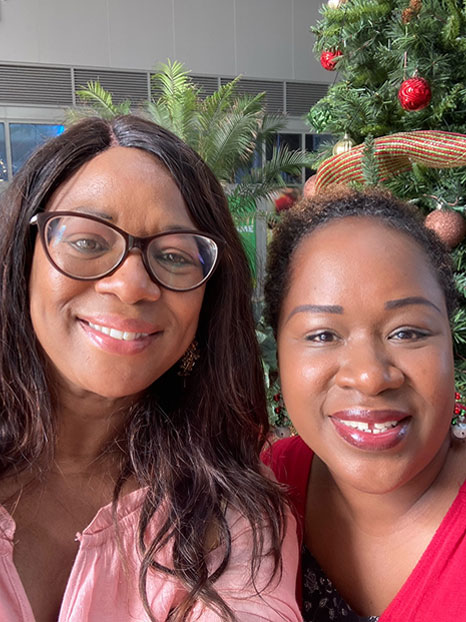Peer Mentor and Mentee Become Lifelong Friends through Sylvester Breast Cancer Peer Mentor Program
By Staff Writer
When you receive a cancer diagnosis, the information that follows seems to flow at an alarming rate. Treatment plans, how many types of appointments you’ll need, what building you go to receive care, what to bring to your treatment, where to park. It’s a long list that, though necessary, can easily exhaust patients.
 Suzanne Isaac with mentor Tresha Barrett
Suzanne Isaac with mentor Tresha BarrettA mentor whose gone through a similar experience can offer a wealth of knowledge and personal experience to the survivor in their diagnosis stage and beyond.
The Breast Cancer Peer Mentorship Program is one such program that pairs breast cancer patients with trained volunteer breast cancer survivors who provide one-on-one emotional support and mentoring. Mentors are carefully matched to new patients based on cancer type, age, language, cultural background, patient preferences, as well as other relevant factors.
Matching with a compatible, like-minded mentor can be a life-changing experience. That’s how it was for Tresha Barrett and Suzanne Isaac.
Tresha, diagnosed with stage 3 breast cancer in July 2017, knew that she wanted to find a way to take her cancer experience and turn it into something positive for someone else. She wondered how she could best help future patients in a similar situation.
“Survivorship has been challenging,” Tresha admitted. “My husband once asked me to describe how I was feeling, and I just didn’t have the words to explain it, and that made me feel bad.”
Tresha knew that others on a similar path would just “get” it. She heard about the peer mentor program through Dr. Teresa Neira, mentoring program director in Cancer Support Services. So, she signed up to be a mentor and waited to be matched.
A couple years after Tresha’s diagnosis, Suzanne started suffering from symptoms consistent with mastitis, but it turned out to be breast cancer. Mastitis can often be overlooked, which might delay treatment. Suzanne started her treatment in January 2020: first with chemotherapy, followed by a left breast mastectomy, skin surgery to remove the cancer that had spread to her skin, and more radiation.
While she was going through this process, she learned about the mentor program and decided to sign up, where she was matched with Tresha in December 2020.
“When you talk to someone outside of this [cancer] world, it feels like you’re dominating the conversation with your experience, and people don’t know what to say,” Suzanne said. “They feel bad for you. And you don’t want to overwhelm them.”
She describes an experience where she informed her family that she needed a blood transfusion, something that she considered to be a non-issue. Her family saw it otherwise.
“It felt like they thought I was dying,” she said. “But I knew that Tresha would get it.”
That’s the beauty of having a mentor through this experience.
Imagine you go through a cancer diagnosis, and you become hyper aware of every little feeling that happens within your body. Survivors experience all kinds of post-treatment and medication-related symptoms. Suzanne explained that it could have been easy to panic about those feelings. But with Tresha as her emotional support and mentor, she was more equipped to recognize that symptoms as a result of her treatment rather than a cause for panic.
“As soon as you get a diagnosis, you need that emotional support,” Suzanne said. “For me, a mentor is someone who is an everyday person, who has been through a similar journey and deals with everyday life stuff. Doctors don’t always have time to go over those things, and mentors do.”
Suzanne came to Tresha for answers, and Tresha answered truthfully from her own experience. Their match made those conversations comfortable and easy.
For those considering the mentor program, Suzanne had this to say, “Take that time for yourself and let yourself be mentored.” In other words, you don’t have to go through this journey alone, whether you’re in treatment or you’re living with the post-treatment side effects.
Tresha described the mentor program as “your own personal support group where you don’t get lost in the shuffle.” She adds that it’s worth it for mentors, too. She enjoys talking to Suzanne, someone who gets it – even at different stages of her journey.
“It will give you something positive while you’re dealing with something really ugly,” Tresha explained. Being a mentor feeds my soul. Suzanne and I will be friends forever. We’ll be at each other’s children’s weddings.”
Their connection, formed in the middle of pandemic, all started with a phone call and quickly blossomed into a lifelong friendship. Now, a year after Tresha and Suzanne first met, they plan to meet for the first time, in person, to celebrate their friend-aversary and Suzanne’s recent news that her scans are all clear.
If you’re a breast cancer or gyn onc survivor interested in becoming a mentor or mentee, please contact Teresa Neira by email at tneira@miami.edu or by phone at 305-243-3149.